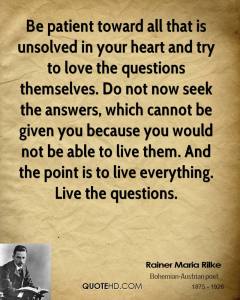The Objectifying Power of Labeling
 Using a language of dehumanization
Using a language of dehumanization
Weaponizing Words
Name-calling is a form of violence and control
Why do we need to dehumanize the “Other”?
Why can't we be human together?
One of my greatest pet peeves is being called a name, any name, outside my own name. No one likes it. Not only that but it breeds mistaken identity. There is no way that one word can sum up all that a person is all about. And yet we continue to be the know-it-all and show off our intelligence (lack of) by our deft use of words. Now that I know, I can show you that I know all about you and maybe even show the world how much I know. As kids when someone did that we taunted with, "Your intelligence is showing!" with the whole playground knowing what we really mean, "Your lack of intelligence is showing!" "Your ignorance is showing!" How often do we hear people from all walks of life all the way up to the highest position in the land labeling whole groups of people with words like:
Liberal, conservative, progressive, fundamentalist, evangelical, Christian, Muslim, atheist, agnostic, right-wing, left-wing, Democrat, Republican, disabled, able-bodied, heterosexual, LGBTQIA, black, white, brown, middle class, rich, poor, beautiful, ugly ... And yet, are we not all human? And yet we stubbornly use names and labels thinking we know, but showing we know nothing.
Besides the destructiveness and violence of name-calling and insulting, this practice is a great absurdity in so many ways showing great human ignorance:
- The nature of words and language show us that labeling and name-calling can never be true. Language is made up of words. And words cannot be the reality. They are only signs and symbols that point to the reality.
- Using the person’s given name does no good for categorizing them because your name is not a descriptor. It is only a distinguisher. That’s it. But for me anyway, that’s the only way that is acceptable simply so we can distinguish the person we wish to talk to. In other words, never call me anything outside of my name.
- The words we use do not demonstrate our competence or power. Like a bully, they are simply a reflection of our shallow paucity of character.
- Given that it is impossible to label a person’s character, qualities, values, and beliefs by using one word, how much more absurd is it to use a whole group of people by using one word. Individuals are much too complex for this to work and thus a group is infinitesimally more complex and impossible.
- Beyond the complexity of each and every individual, there is the complexity of all of these political and religious ideologies and categories that we think we “know” when we use blanket name-calling.
- So my initial conclusion to this absurdity is that name-calling can never be meaningful, accurate, or useful, so it ends up being a weaponization of words to use against a person or a group in order to violate the identity or integrity of that person or group; demeaning and destroying those people in one’s mind and in the minds of others.
- The definition I use for violence happens to be one from Parker Palmer, “Violence is when we violate the identity and integrity of another.” Sound familiar?
- My conclusion regarding this ridiculous practice is that it is the lazy man’s way of spouting off what he doesn’t know and has no ability or desire to learn. And with the extreme derogatory effects it has can quickly become an act of violence and hence war; either individually or collectively.
We are so quick to label people often resulting in false stereotypes, prejudice, and racism. We label so we can separate something out from the whole and understand it better; knowing more precisely what we are getting. Labeling works great in a grocery store. We can see what it is we are buying and even find out all of the ingredients contained in it . . . by the label assigned to the product.
Labeling is also necessary in the medical field and the mental health field. Labels are used in diagnoses which help doctors to prescribe medication and hospitals to provide treatment. These labels also can be tied to funding sources that would not have been available without the label.
And to bring in another perspective, it is impossible to live in this world without using labels. After all, words themselves are signs and symbols that point to reality. In other words, even words are a form of labeling. But that’s precisely why we are so quickly hoodwinked and hijacked; deceived by labels. Life is full of them and they are familiar. And when something is familiar, we tend to take it for granted and allow it to go on autopilot; disengaging our minds. When that happens then it is very easy to mindlessly succumb and become numb to name calling and other labels out of laziness, the lack of effort to communicate mindfully and meaningfully.
All communication must be intentional. We must know what it is that we want to say, how we want to say it, and make sure that what we say brings the result that we are looking for. So often, the process gets hijacked and we end up with a train wreck because we were not intentional about what we need to say, why we need to say it, how we need to say it, and how we need it to come out. We are responsible for each and every word we say and we know that, as the Bible says, a word can be a spark that starts a fire that burns down a forest; everything we value.



